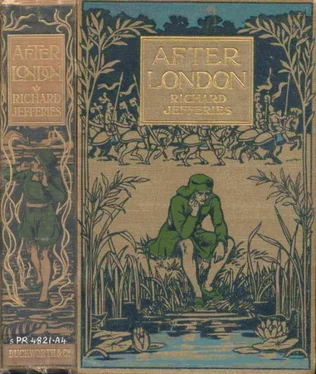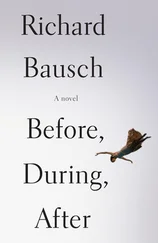Richard Jefferies - After London
Здесь есть возможность читать онлайн «Richard Jefferies - After London» весь текст электронной книги совершенно бесплатно (целиком полную версию без сокращений). В некоторых случаях можно слушать аудио, скачать через торрент в формате fb2 и присутствует краткое содержание. Город: London, Год выпуска: 1905, Издательство: Duckworth & Co., Жанр: sf_postapocalyptic, на английском языке. Описание произведения, (предисловие) а так же отзывы посетителей доступны на портале библиотеки ЛибКат.
- Название:After London
- Автор:
- Издательство:Duckworth & Co.
- Жанр:
- Год:1905
- Город:London
- ISBN:нет данных
- Рейтинг книги:4 / 5. Голосов: 1
-
Избранное:Добавить в избранное
- Отзывы:
-
Ваша оценка:
- 80
- 1
- 2
- 3
- 4
- 5
After London: краткое содержание, описание и аннотация
Предлагаем к чтению аннотацию, описание, краткое содержание или предисловие (зависит от того, что написал сам автор книги «After London»). Если вы не нашли необходимую информацию о книге — напишите в комментариях, мы постараемся отыскать её.
(1885), set in a future in which urban civilization has collapsed after an environmental crisis.” (From
).
This eBook is for the use of anyone anywhere at no cost and with almost no restrictions whatsoever. You may copy it, give it away or re-use it under the terms of the Project Gutenberg License included with this eBook or online at
* * *
After London — читать онлайн бесплатно полную книгу (весь текст) целиком
Ниже представлен текст книги, разбитый по страницам. Система сохранения места последней прочитанной страницы, позволяет с удобством читать онлайн бесплатно книгу «After London», без необходимости каждый раз заново искать на чём Вы остановились. Поставьте закладку, и сможете в любой момент перейти на страницу, на которой закончили чтение.
Интервал:
Закладка:
A beautiful sea it is, clear as crystal, exquisite to drink, abounding with fishes of every kind, and adorned with green islands. There is nothing more lovely in the world than when, upon a calm evening, the sun goes down across the level and gleaming water, where it is so wide that the eye can but just distinguish a low and dark cloud, as it were, resting upon the horizon, or perhaps, looking lengthways, cannot distinguish any ending to the expanse. Sometimes it is blue, reflecting the noonday sky; sometimes white from the clouds; again green and dark as the wind rises and the waves roll.
Storms, indeed, come up with extraordinary swiftness, for which reason the ships, whenever possible, follow the trade route, as it is called, behind the islands, which shelter them like a protecting reef. They drop equally quickly, and thus it is not uncommon for the morning to be calm, the midday raging in waves dashing resistlessly upon the beach, and the evening still again. The Irish, who are accustomed to the salt ocean, say, in the suddenness of its storms and the shifting winds, it is more dangerous than the sea itself. But then there are almost always islands, behind which a vessel can be sheltered.
Beneath the surface of the Lake there must be concealed very many ancient towns and cities, of which the names are lost. Sometimes the anchors bring up even now fragments of rusty iron and old metal, or black beams of timber. It is said, and with probability, that when the remnant of the ancients found the water gradually encroaching (for it rose very slowly), as they were driven back year by year, they considered that in time they would be all swept away and drowned. But after extending to its present limits the Lake rose no farther, not even in the wettest seasons, but always remains the same. From the position of certain quays we know that it has thus remained for the last hundred years at least.
Never, as I observed before, was there so beautiful an expanse of water. How much must we sorrow that it has so often proved only the easiest mode of bringing the miseries of war to the doors of the unoffending! Yet men are never weary of sailing to and fro upon it, and most of the cities of the present time are upon its shore. And in the evening we walk by the beach, and from the rising grounds look over the waters, as if to gaze upon their loveliness were reward to us for the labour of the day.
Part II
WILD ENGLAND
CHAPTER I
SIR FELIX
On a bright May morning, the sunlight, at five o’clock, was pouring into a room which face the east at the ancestral home of the Aquilas. In this room Felix, the eldest of the three sons of the Baron, was sleeping. The beams passed over his head, and lit up a square space on the opposite whitewashed wall, where, in the midst of the brilliant light, hung an ivory cross. There were only two panes of glass in the window, each no more than two or three inches square, the rest of the window being closed by strong oaken shutters, thick enough to withstand the stroke of an arrow.
In the daytime one of these at least would have been thrown open to admit air and light. They did not quite meet, and a streak of sunshine, in addition to that which came through the tiny panes, entered at the chink. Only one window in the house contained more than two such panes (it was in the Baroness’s sitting-room), and most of them had none at all. The glass left by the ancients in their dwellings had long since been used up or broken, and the fragments that remained were too precious to be put in ordinary rooms. When larger pieces were discovered, they were taken for the palaces of the princes, and even these were but sparingly supplied, so that the saying “he has glass in his window” was equivalent to “he belongs to the upper ranks”.
On the recess of the window was an inkstand, which had been recently in use, for a quill lay beside it, and a sheet of parchment partly covered with writing. The ink was thick and very dark, made of powdered charcoal, leaving a slightly raised writing, which could be perceived by the finger on rubbing it lightly over. Beneath the window on the bare floor was an open chest, in which were several similar parchments and books, and from which the sheet on the recess had evidently been taken. This chest, though small, was extremely heavy and strong, being dug out with the chisel and gouge from a solid block of oak. Except a few parallel grooves, there was no attempt at ornamentation upon it. The lid, which had no hinges, but lifted completely off, was tilted against the wall. It was, too, of oak some inches thick, and fitted upon the chest by a kind of dovetailing at the edges.
Instead of a lock, the chest was fastened by a lengthy thong of oxhide, which now lay in a coil on the floor. Bound round and round, twisted and intertangled, and finally tied with a special and secret knot (the ends being concealed), the thong of leather secured the contents of the chest from prying eyes or thievish hands. With axe or knife, of course, the knot might easily have been severed, but no one could obtain access to the room except the retainers of the house, and which of them, even if unfaithful, would dare to employ such means in view of the certain punishment that must follow? It would occupy hours to undo the knot, and then it could not be tied again in exactly the same fashion, so that the real use of the thong was to assure the owner that his treasures had not been interfered with in his absence. Such locks as were made were of the clumsiest construction. They were not so difficult to pick as the thong to untie, and their expense, or rather the difficulty of getting a workman who could manufacture them, confined their use to the heads of great houses. The Baron’s chest was locked, and his alone, in the dwelling.
Besides the parchments which were nearest the top, as most in use, there were three books, much worn and decayed, which had been preserved, more by accident than by care, from the libraries of the ancients. One was an abridged history of Rome, the other a similar account of English history, the third a primer of science or knowledge; all three, indeed, being books which, among the ancients, were used for teaching children, and which, by the men of those days, would have been cast aside with contempt.
Exposed for years in decaying houses, rain and mildew had spotted and stained their pages; the covers had rotted away these hundred years, and were now supplied by a broad sheet of limp leather with wide margins far overlapping the edges; many of the pages were quite gone, and others torn by careless handling. The abridgment of Roman history had been scorched by a forest fire, and the charred edges of the leaves had dropped away in semicircular holes. Yet, by pondering over these, Felix had, as it were, reconstructed much of the knowledge which was the common (and therefore unvalued) possession of all when they were printed.
The parchments contained his annotations, and the result of his thought; they were also full of extracts from decaying volumes lying totally neglected in the houses of other nobles. Most of these were of extreme antiquity, for when the ancients departed, the modern books which they had composed being left in the decaying houses at the mercy of the weather, rotted, or were destroyed by the frequent grass fires. But those that had been preserved by the ancients in museums escaped for a while, and some of these yet remained in lumber-rooms and corners, whence they were occasionally dragged forth by the servants for greater convenience in lighting the fires. The young nobles, entirely devoted to the chase, to love intrigues, and war, overwhelmed Felix Aquila with ridicule when they found him poring over these relics, and being of a proud and susceptible spirit, they so far succeeded that he abandoned the open pursuit of such studies, and stole his knowledge by fitful glances when there was no one near. As among the ancients learning was esteemed above all things, so now, by a species of contrast, it was of all things the most despised.
Читать дальшеИнтервал:
Закладка:
Похожие книги на «After London»
Представляем Вашему вниманию похожие книги на «After London» списком для выбора. Мы отобрали схожую по названию и смыслу литературу в надежде предоставить читателям больше вариантов отыскать новые, интересные, ещё непрочитанные произведения.
Обсуждение, отзывы о книге «After London» и просто собственные мнения читателей. Оставьте ваши комментарии, напишите, что Вы думаете о произведении, его смысле или главных героях. Укажите что конкретно понравилось, а что нет, и почему Вы так считаете.












